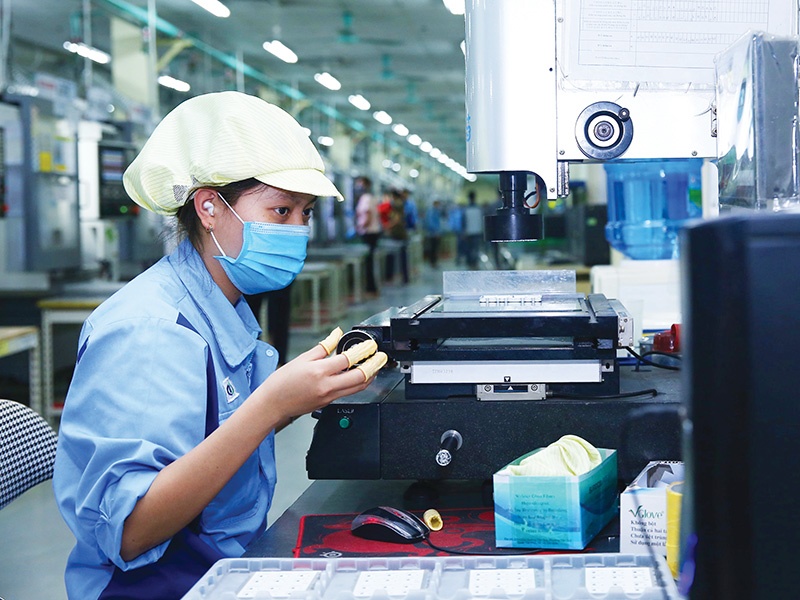Japan’s investors pinpoint pivotal year
How much did the pandemic impact Japanese businesses in Vietnam in 2021?
 |
| Hirai Shinji, chief representative of the Japan Trade Promotion Organization in Ho Chi Minh City |
We conducted a survey among the members of the Japanese Chamber of Commerce and Industry in Ho Chi Minh City last November to assess the impact of the health crisis.
Among 1,041 members, 344 companies responded. Around 63 per cent (215 companies) experienced losses between July and September, and 19 per cent (67 companies) suffered from a loss in sales, decreasing more than 50 per cent in comparison with the sales in the third quarter of 2020.
Japanese manufacturing companies in Vietnam did their best not to disrupt the global supply chain. However, almost half of them operated at less than 50 per cent of their normal production capacity in the third quarter of last year because they faced difficulty in securing sufficient labour to continue the stay-at-work model.
Now, most factories have resumed operation with full capacity, thanks to the new policies of the government.
Japanese investors started pouring more funds into non-manufacturing sectors in Vietnam, such as Mizuho’s investment in MoMo and SMBC’s acquisition of FE Credit. How do you see the interest of Japanese investors in the coming years?
Japanese companies see Vietnam not only as a production base but also as a growing domestic consumption market. According to our latest survey conducted in August, 55.3 per cent of Japanese companies intend to expand their business in Vietnam in the coming one to two years.
The survey was conducted during the lockdown in the summer, so the result shows the fundamental strength and attractiveness of Vietnamese economy, such as its abundant, young labour force and potential for economic growth.
In the past, Japanese manufacturers mainly conducted outsourcing activities in Vietnam for export to Japan. Over the past year, Vietnam has emerged as a key manufacturing hub for Japanese investors in the region.
We observe a trend of firms investing in cutting-edge technology to produce high value-added products in the country. The products are not only exported to Japan but also to the regional markets.
For instance, Japanese medical equipment makers are ramping up operation in the country. They had to invest in modern technology and production processes in Vietnam to ensure the high requirements for medical devices. Moving forward, we expect a wave of Japanese investment will flow into Vietnam’s high-tech industry.
 |
| Japanese enterprises have been grappling with insufficient labour numbers, photo Le Toan |
What are the positive factors that contribute to driving Japanese investments in 2022?
Vietnamese Prime Minister Pham Minh Chinh’s visit to Japan in November was timely and encouraging for Japanese and Vietnamese business cooperation. During the Investment Promotion Conference, 45 MoUs amounting to about $12 billion were witnessed by PM Chinh. As many projects as possible among the MoUs are expected to be materialised by 2023, when Japan and Vietnam will celebrate their 50th anniversary of diplomatic relations.
In addition, Japanese investment in Vietnam is expected to be more active in 2022 if international business trips are easier again. Japanese businesspeople want to visit Vietnam and assess the investment environment, such as the industrial sites and technological capability of Vietnamese suppliers, with their own eyes, rather than relying on an online meeting.
What the stars mean:
★ Poor ★ ★ Promising ★★★ Good ★★★★ Very good ★★★★★ Exceptional
Related Contents
Latest News
More News
- Hermes joins Long Thanh cargo terminal development (February 04, 2026 | 15:59)
- SCG enhances production and distribution in Vietnam (February 04, 2026 | 08:00)
- UNIVACCO strengthens Asia expansion with Vietnam facility (February 03, 2026 | 08:00)
- Cai Mep Ha Port project wins approval with $1.95bn investment (February 02, 2026 | 16:17)
- Repositioning Vietnam in Asia’s manufacturing race (February 02, 2026 | 16:00)
- Manufacturing growth remains solid in early 2026 (February 02, 2026 | 15:28)
- Navigating venture capital trends across the continent (February 02, 2026 | 14:00)
- Motivations to achieve high growth (February 02, 2026 | 11:00)
- Capacity and regulations among British areas of expertise in IFCs (February 02, 2026 | 09:09)
- Transition underway in German investment across Vietnam (February 02, 2026 | 08:00)

 Tag:
Tag:




















 Mobile Version
Mobile Version